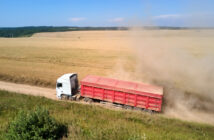Following Russian drone attacks earlier this week, which have damaged the infrastructure and destroyed grain storage facilities in the port of Reni on the Danube, the price of wheat including UK feed wheat futures rose sharply.
As reported last week the Danube has increasingly become an important artery for Ukraine trade since the start of the war. This was expected to increase dramatically since the end of the Black Sea initiative last week. Before the air strikes Rabobank estimated that the export capacity of the Danube ports was 2.5m tonnes of grain. If the air strikes continue then this figure could fall dramatically.
Also it should be noted that Ukrainian exports into the EU are limited as they were forcing down EU prices. Exports to the neighbouring countries is only allowed if the grain is in transit to elsewhere.
Helen Plant senior analyst Cereals and Oilseeds AHDB says: “Lower exports from Ukraine would again put extra pressure on other major exporters to supply the world. This would especially impact wheat, given the smaller US crop, and that stocks in major exporting countries were already expected to fall to multi-year lows.
EU projections cut
“One of the regions where the market will look to help meet global demand, at least in the short term, is the EU. Yesterday, the European Commission monthly MARS report cut its projections for all cereal and oilseed yields, apart from winter barley. The cuts follow drier-than-usual conditions in larger parts of western, central and northern Europe, as well as in eastern Romania; these downgrades added to the market sentiment this week.”
The intense heatwave across much of Europe in the past few weeks has made the EU trim yield forecasts for all cereal and oilseed crops except winter barley. For many crops, though, yield forecasts remain above the 5-year average. However, this is notably not the case for spring barley and sunflower yield forecasts, the most impacted by recent cuts. A downgrade in sunflower yield prospects for the key producer, Romania, was a key reason for this. For spring barley, the report details substantial downward revisions for Denmark, Sweden, Finland and the Baltic Sea.
For many crops, though, yield forecasts remain above the 5-year average. However, this is notably not the case for spring barley and sunflower yield forecasts, the most impacted by recent cuts. A downgrade in sunflower yield prospects for the key producer, Romania, was a key reason for this. For spring barley, the report details substantial downward revisions for Denmark, Sweden, Finland and the Baltic Sea. As well as the hot weather conditions, rain has been delaying harvest and causing potential impacts on grain quality in parts of Bulgaria, Romania, Slovenia, Croatia and Hungary and certain parts of Russia which could lead to grain quality problems.
Helen Plant senior analyst Cereals and Oilseeds AHDB , says: with export uncertainty surrounding Ukrainian grain, reliance on other major global exporters for global supply becomes increasingly in focus. This is particularly true for wheat, with stocks in global major exporters tight, though wheat stocks this season on the continent are still expected to be ample. But if quality issues are confirmed as EU harvests progress, we could see a widening of the gap between feed quality prices and other grades. Something to follow closely.”




